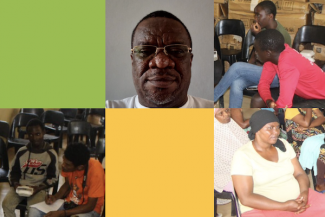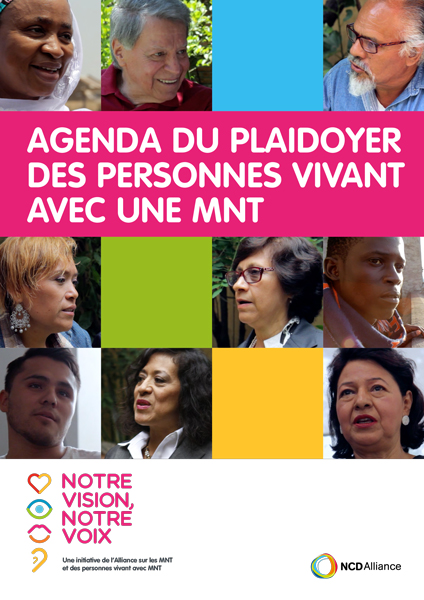“Putting the focus on people living with NCDs will change the landscape of NCDs globally and locally,” said Professor Taiwo Lateef Sheikkh of Africa CDC at the event, which was convened by the Africa NCDs Network (ANN). He added that the Africa Advocacy Agenda will support regional and global NCD strategies, underlining the importance of aligning a people-centred approach with the strategic plans and governance procedures of government health-related programmes across Africa.
The Africa Advocacy Agenda is the first regional agenda of its kind and seeks to amplify the voices of millions in Africa. Its development was led by people living with NCDs from across the region and coordinated by the ANN as part of NCD Alliance (NCDA)’s Our Views Our Voices initiative, possible through its partnership with the Leona M and Harry B Helmsley Charitable Trust. It underlines key challenges and calls to action to address Africa’s NCD burden within four pillars: 1. Human rights and social justice, 2. Prevention, 3. Treatment, care and support, and 4. Meaningful involvement.
People with lived experience key to NCD response?
Advocacy Agendas of People Living with NCDs are the cornerstone of NCDA’s Our Views Our Voices initiative and promote a people-centred approach to shaping health systems and policies around the world. People with lived experience have unique, first-hand insights and expertise of the contextual challenges around NCD prevention, diagnosis and care, and are active players in shaping their own health. Their role in the NCD response is integral to achieving broader health and sustainable development goals – at global, regional, national and local levels.
Since the Global Advocacy Agenda was developed in 2017, resounding calls to put people living with NCDs at the forefront of the NCD response have been made across the globe, in both political and community spheres. To date, this has resulted in the development of nine national advocacy agendas, five within the Africa region: Kenya, Ghana, Rwanda, Tanzania and Malawi. Now focus has expanded to the regional level.
Over the past two decades, there has been a surge in the NCD burden in sub-Saharan Africa. NCDs are to overtake communicable, maternal, neonatal and nutritional diseases (CMNN) combined by 2030 as the leading cause of mortality in the region. To sustainably solve this public health crisis and meet global NCD targets, people living with NCDs must be at the centre of ongoing work by global and regional bodies, namely WHO, WHO AFRO and Africa CDC.
“To accelerate progress on noncommunicable diseases (NCDs) response in Africa, we should unite to take a stand, claim our health rights, and put an end to political inertia. For African countries to respond effectively to the rising NCD burden, we the people living with NCDs must be at the heart of decision-making processes and bodies. Our views and voices heard. Our presence, passion, dedication, and insights stand to lend vigour and urgency to an NCD response that truly reflects our needs and priorities in Africa.”
- Africa Regional Advocacy Agenda of People Living with NCDs
At the launch, Kwanele Asante, an advocate living with NCDs and member of the ANN Advisory Group, underlined the rise of global health justice and the need to empower African researchers and advocates to change the narrative of the NCD response. “It is now time that we start centering and realizing the rights of people living with NCDs, by making sure that we promote a human rights-based approach and invest in training and upskilling people to make sure that we define research agendas in terms of what should be prioritized from a patient’s perspective,” said Ms. Asante.
She also called for the establishment of an Institute on Patient Engagement in the region, as well as the adoption of the Africa Advocacy Agenda into the strategic plans of the Africa CDC and WHO.
Other speakers at the launch included Charlotte Aberdein of NCDA and Arafa Said, an advocate from Tanzania living with Sickle Cell Disease, who provided opening remarks. George Msengi of ANN and Dr Zipporah Ali, a person with lived experience of NCDs and consultant on the project, outlined the process undertaken to develop the Africa Advocacy Agenda.
NCDA’s Katrina Barker discussed ways that the Africa Advocacy Agenda can support and complement NCD strategies at regional and global levels, with a nod towards synergies with the upcoming launch of the WHO Framework on Meaningful Engagement of People Living with NCDs, the NCDA Global Charter on Meaningful Involvement of People Living with NCDs (2021) and the Africa CDC Non Communicable Diseases, Injuries Prevention and Control and Mental Health Promotion Strategy (2022-26).
Closing remarks were provided by John Gikonyo, an advocate living with NCDs and member of the ANN Advisory Group, as well as Professor Kaushik Rumaiya, President Elect of ANN. He called for monitoring and evaluation measures to be implemented in the next six months, to assess the effectiveness, utilization and outcomes of the Africa Advocacy Agenda.


